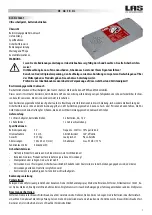
5-298
N60 NETWORK STABILITY AND SYNCHROPHASOR MEASUREMENT SYSTEM – INSTRUCTION MANUAL
INPUTS/OUTPUTS
CHAPTER 5: SETTINGS
5
5.9.3 Contact outputs
5.9.3.1 Digital outputs
SETTINGS
INPUTS/OUTPUTS
CONTACT OUTPUTS
CONTACT OUTPUT H1
A contact inputs and outputs are digital signals associated with connections to hard-wired contacts. Wet and dry contacts
are supported.
Upon startup of the relay, the main processor determines from an assessment of the modules installed in the chassis
which contact outputs are available and then presents the settings for only these outputs. Where the contact input is non-
latching, the settings are as shown.
An ID can be assigned to each contact output. The signal that can OPERATE a contact output can be any FlexLogic
operand (virtual output, element state, contact input, or virtual input). An additional FlexLogic operand can be used to
SEAL-IN the relay. Any change of state of a contact output can be logged as an Event if programmed to do so.
For example, the trip circuit current is monitored by providing a current threshold detector in series with some Form-A
contacts (see the trip circuit example in the Digital Elements section). The monitor sets a flag (see the specifications for
Form-A). The name of the FlexLogic operand set by the monitor, consists of the output relay designation, followed by the
name of the flag; for example,
Cont OP 1 IOn
.
In most breaker control circuits, the trip coil is connected in series with a breaker auxiliary contact used to interrupt current
flow after the breaker has tripped, to prevent damage to the less robust initiating contact. This can be done by monitoring
an auxiliary contact on the breaker which opens when the breaker has tripped, but this scheme is subject to incorrect
operation caused by differences in timing between breaker auxiliary contact change-of-state and interruption of current in
the trip circuit. The most dependable protection of the initiating contact is provided by directly measuring current in the
tripping circuit, and using this parameter to control resetting of the initiating relay. This scheme is often called trip seal-in.
This can be realized using the
Cont OP 1 IOn
FlexLogic operand to seal-in the contact output as follows:
CONTACT OUTPUT H1 ID
: “
Cont Op 1
"
OUTPUT H1 OPERATE
: any suitable FlexLogic operand
OUTPUT H1 SEAL-IN
: “
Cont Op 1 IOn
”
CONTACT OUTPUT H1 EVENTS
: “Enabled”
Figure 5-163: Contact input/output module type 6A contact 1 logic
CONTACT OUTPUT H1
CONTACT OUTPUT H1 ID
Cont Op 1
Range: up to 20 alphanumeric characters
OUTPUT H1 OPERATE:
Off
Range: FlexLogic operand
OUTPUT H1 SEAL-IN:
Off
Range: FlexLogic operand
CONTACT OUTPUT H1
EVENTS: Enabled
Range: Disabled, Enabled
















































